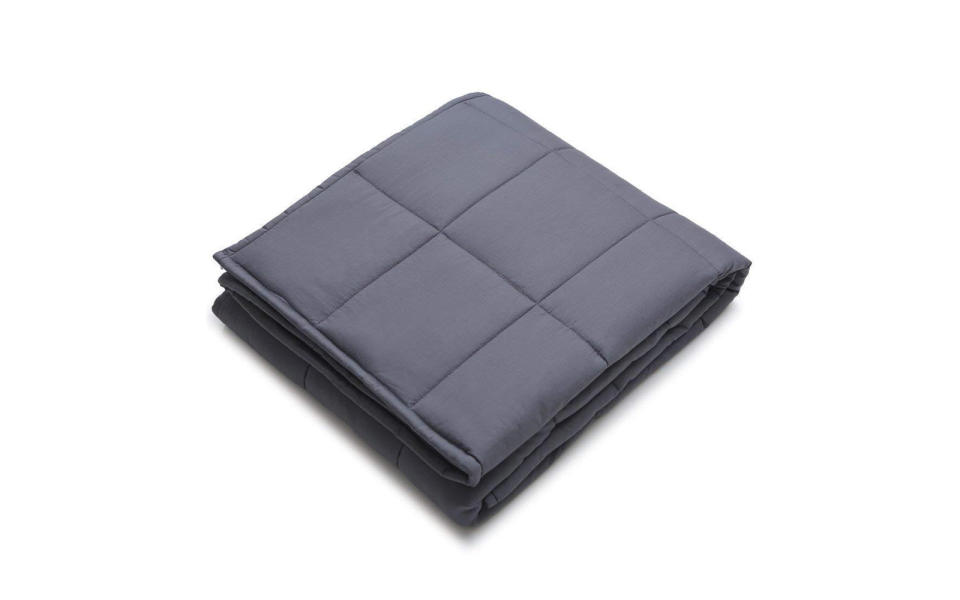How Weighted Blankets Work — and 5 to Try for Yourself
With a rising focus on better sleep hygiene permeating our current wellness culture, it's easy to see why weighted blankets have suddenly skyrocketed in popularity. They're exactly what they sound like: blankets weighed down with evenly distributed pellets or metal chains or woven with a weighted yarn. And the concept has been used for decades by the medical community to calm hyperactive children or comfort patients with autism spectrum disorder or sensory processing disorder, but it hasn't gone mainstream, so to speak, until the past year or so.
Having experienced the calming effects firsthand, I can indeed confirm that cozying up under a weighted blanket really does feel like a full-body hug. But reading customer reviews online can make them sound like a magical cure-all for insomnia, anxiety, and stress, so we wanted to look further into the science. I asked Kathrin Hamm, founder of the just-launched weighted bedding brand Bearaby, to take us a little bit deeper.
How do weighted blankets work?
Hamm explained weighted bedding helps “ground the body” during sleep, making you feel like you’re being hugged or swaddled, which can be a powerful stimulus for relaxation. This sensation is often referred to as deep touch pressure (DTP), a type of therapy that calms the nervous system. A 2004 study suggested that this grounding technique significantly reduced subjects' night-time levels of cortisol — AKA the stress hormone — and it synchronized their cortisol levels with the normal, 24-hour circadian rhythm.
What are the benefits of using weighted blankets?
A 2015 study conducted in Sweden showed objectively that a weighted blanket both increased sleep bout time and decreased movement during sleep. Subjectively, the patients reported it was “easier to settle down to sleep” and that they “felt more refreshed in the morning.” As for DTP's effects on anxiety, the research is a little less conclusive. In one 2006 study conducted on 32 adults, 63 percent of them reported lower anxiety after use.
For Hamm, it's also helped her become more mindful of her sleep habits. “For me, sleeping under weight means falling asleep faster and I feel more refreshed and energized when I wake up in the morning,” she said. “I used to be a real night owl, staying up late, thinking I am more productive that way. I have shifted to becoming a morning person and I also take the time to exercise and have a healthy breakfast in the morning.”
How much weight will work best for you?
Medical scientists generally recommend you choose a blanket that weighs around 10 percent of your body weight. So, if you weigh 160 pounds, you'll want at least 15 pounds of blanket to feel the effects. Hamm advises you consider a few other factors, too, such as sleep history and goals. “Generally, someone who struggles more with falling asleep should have a heavier weight,” she advised. Bearaby actually has a survey on its site that uses your weight and sleeping habits to email you a recommendation for both weight and size.
Below, you'll find Bearaby's gorgeous woven Napper and more of the most popular weight blanket brands out there right now and all of the weights they currently offer.
Bearaby The Napper
Available weight: 20 lb.
To buy: bearaby.com, $259

Courtesy of Bearaby
best weighted blanket
YnM Weighted Blanket 100% Cotton With Glass Beads
Available weights: 5 lb., 7 lb., 10 lb., 15 lb., 25 lb.
To buy: amazon.com, from $67

Courtesy of Amazon
best weighted blanket
BlanQuil Quilted Weighted Blanket
Available weights: 7 lb., 15 lb., 20 lb.
To buy: amazon.com, from $169

Courtesy of Amazon
best weighted blanket
Gravity Bed Blanket
Available weights: 15 lb., 20 lb., 25 lb.
To buy: target.com, $250

Courtesy of Target
best weighted blanket
Nex Weighted Blanket
Available weights: 15 lbs., 17 lbs., 20 lbs.
To buy: walmart.com, from $100 on sale (originally from $119)

Courtesy of Walmart
nex weighted blanket

